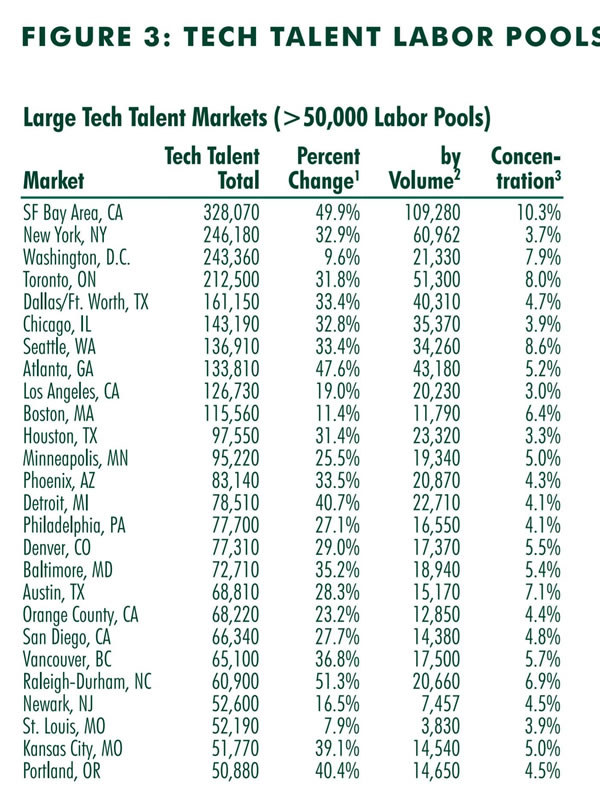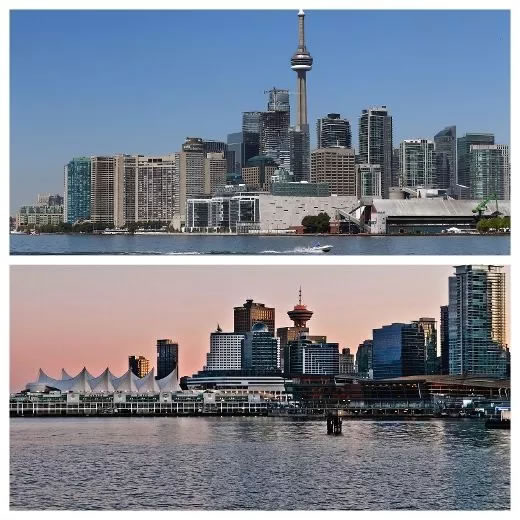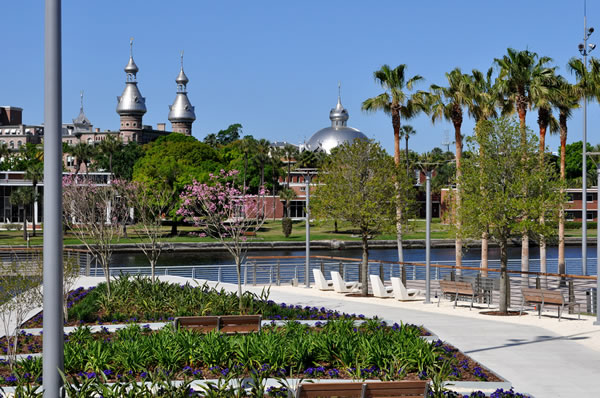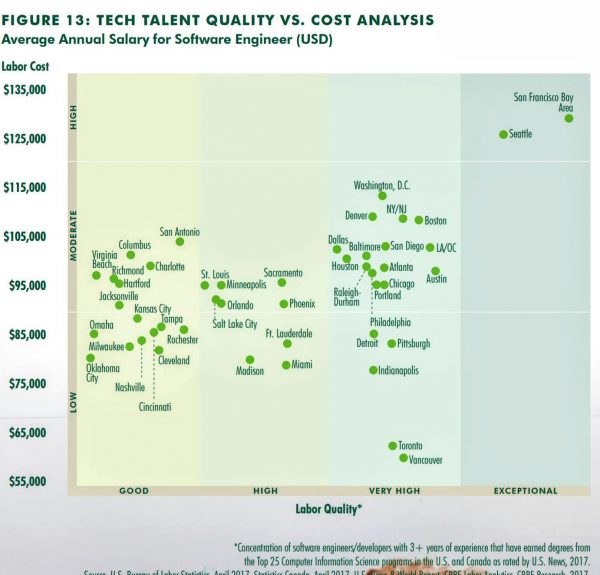Click the graph to see it at full size.
CBRE’s Tech Talent Quality vs. Cost Analysis graph (shown above) is getting a lot of discussion among my Canadian techie friends and fellow Canadian techie expats living in the U.S. because it shows something we’ve been telling everyone for years: for the best bang for your labor buck, you really want to go with a Canadian techie (especially if you’re spending US dollars; at the time of writing, $1CAD = $0.80USD).
It also shows that Florida is showing some promise: out of 47 metro areas in the graph, 5 of them are in the Sunshine state. Listed by increasing x, where the x-axis is labor quality, which in turn is defined in the graph as “concentration of software engineers/developers with 3+ years experience that have earned degrees from the top 25 Computer Information Science programing in the U.S. and Canada as rated by U.S. News*, 2017”, these places are:
- Jacksonville
- Tampa
- Orlando
- Miami
- Fort Lauderdale
* Take the precise positions of areas on the graph with a grain of salt. There are some oddities on both axes. For starters, I find it hard to believe that the average tech salary in much pricier Miami is lower than in Tampa (or Madison!). As for “labor quality”, that’s derived from U.S. News and World Report’s Best Colleges Guide, whose rankings can be bought and shouldn’t be taken seriously.
Toronto and Vancouver also place in North America’s largest tech talent pools. At 4th place, Toronto is just behind Washington, D.C., which in turn is beaten only by the San Francisco Bay Area and New York City. Toronto has considerably more tech talent than the next three cities to metros after it: Dallas/Fort Worth, Chicago, and surprisingly, Seattle (home of both Microsoft and Amazon):

All this comes from CBRE’s Scoring Tech Talent in North America 2017 report, which they describe as “a comprehensive analysis of labor market conditions, cost and quality for highly skilled tech workers in the U.S. and Canada.” It takes the 50 largest markets and ranks them using several criteria, including “competitive advantages and appeal to tech employers and tech talent”, and “provides insight into the quality of tech talent, their demographics and how tech talent growth patterns are impacting cities and real estate markets”.
I found out about the report via my friend, startup/marketing/operations expert April Dunford, who posted the graph and table above on her Facebook account. You can find the report here, but it’s available only to people with a CBRE account.
If you were wondering why you haven’t heard of a technology organization called CBRE, it’s because they’re not in tech. CBRE Group is a Los Angeles-based commercial real estate company — in fact, after acquiring part of ING in 2011, they’re the largest real estate investment manager in the world. Knowing that, it becomes clear why a real estate company would research tech talent and where to find it: they make money from office space, and a good market for that product is well-paid white collar workers who gravitate towards perks like premium office space.

Toronto and Vancouver skylines, as seen from the water.
I’ll leave it to other people, especially my techie friends, to discuss the meaning of Toronto’s and Vancouver’s rankings discuss CBRE’s Scoring Tech Talent in North America 2017 report at length. I’ll just say that I cut my professional software development teeth in Toronto, and during my time at Microsoft and Shopify, spent a fair bit of time in Vancouver’s tech scene. Having seen both these cities, I can attest to their techie bang for the buck, and I’ve watched how they’ve grown from relative software backwaters to overlooked gems to software powerhouses…and I took notes (a number of which you’ll see in my blogs, Global Nerdy and The Adventures of Accordion Guy in the 21st Century).

University of Tampa’s distinctive minarets, as seen from across the river in Curtis Hixon Park.
I’m now in Tampa, and I want to take the lessons of Toronto and Vancouver and apply them to my new home. Tampa has its own advantages, such as a sub-tropical climate, low cost of living, and a “brain gain” resulting from hundreds of thousands of people moving to the Orlando-Tampa corridor every year. Tampa also has its challenges, including geographical fragmentation thanks to Tampa Bay, the deadly combo of automobile overdependence and a lot of bad urban design decisions, and a significant chunk of the population that just wants a big lawn, a nearby mall with big box stores and chain restaurants, and a nap.
The strong Tampa/Florida presence on the Tech Talent Quality vs. Cost Analysis is an indicator is that something’s happening here in the Sunshine State. We can choose to maintain this momentum, make the best use of our brainpower and location and move ourselves farther right (and hey, up) on the graph, or we can choose to do the safe, lazy thing and rely solely on tourism. I’m choosing the former, and plan to take what I learned from being in Toronto and Vncouver to work with local like-minded people to help bring it about.

